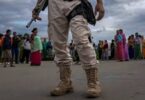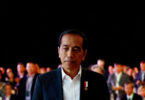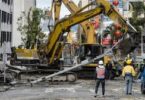Kyaw Ye Lynn
YANGON: Myanmar authorities are building security force bases and bulldozing land where Rohingya villages were burned to the ground just months ago, according to international rights group A-mnesty International Mon-day.
In its new report titled Remaking Rakhine State, Amnesty revealed through eyewitness testimony and expert analysis of satellite images how “flattening of Rohingya villages and new construction have intensified since January in areas where hundreds of thousands fled the military’s campaign of ethnic cleansing last year.
“New roads and structures are being built over burned Rohingya villages and land, making it even less likely for refugees to return to their homes.”
The rights body warned that militarization in Myanmar’s Rakhine State was continuing at an “alarming pace”.
Amnesty International’s Crisis Response Director Tirana Hassan said: “What we are seeing in Rakhine State is a land grab by the military on a dramatic scale. New bases are being erected to house the very same security forces that have committed crimes against humanity against Rohingya.
“This makes the voluntary, safe and dignified return of Rohingya refugees an even more distant prospect. Not only are their homes gone, but the new construction is entrenching the already dehumanizing discrimination they have faced in Myanmar.”
New construction has intensified in Maungdaw area since January when the Myanmar military admitted to the massacre of 10 Rohingya men.
– Mosques destroyed
Amnesty International also documented recent examples of looting, deliberate burning and demolition of abandoned Rohingya homes and mo-sques across northern Rakh-ine State. “The authorities have demolished mosques and madrasas during operations to clear burnt villages,” Amnesty said in its report.
“During the violence [in August], they burnt down almost all the houses. Since January, they started to bulldoze the mosques, madrasas and big houses which were still intact,” a 52-year-old religious leader from Zin Paing Nyar village in northern Maungdaw Township, who took shelter in Bangladesh since early February, was quoted as saying in the report.
Amnesty said this raises serious concerns that authorities were destroying evidence of crimes against the Rohingya, which could hinder future investigations.
“The bulldozing of entire villages is incredibly worrying. Myanmar’s authorities are erasing evidence of crimes against humanity, making any future attempts to hold those responsible to account extremely difficult,” Hassan added.
Since Aug. 25, 2017, more than 750,000 refugees, mostly children and women, have fled Myanmar and crossed into Bangladesh after Myanmar forces launched a crackdown on the minority Muslim community, according to rights groups.
The refugees are fleeing a military operation in which security forces and Buddhist mobs have killed men, women and children, looted homes, and torched Rohingya villages. At least 9,000 Rohingya were killed in Rakhine state from Aug. 25 to Sept. 24 last year, according to Doctors Without Borders.
In a report published on Dec. 12, 2017, the humanitarian group said the deaths of 71.7 percent or 6,700 Rohingya were caused by violence. They include 730 children below the age of five.
– Myanmar yet to respond
Turkey has been at the forefront of providing aid to Rohingya refugees, and President Recep Tayyip Erdogan has raised the issue at the UN. The Rohingya, described by the UN as the world’s most persecuted people, have faced heightened fears of attack since dozens were killed in communal violence in 2012. The UN documented mass gang rapes, killings — including of infants and young children — brutal beatings, and disappearances committed by security personnel. So far, Myanmar authorities have not responded to the latest Amnesty International report.
Myanmar and its Nobel prize winning State Counsellor Aung San Suu Kyi have come under heavy international criticism for disallowing independent rights experts and journalists access to the area to investigate the allegations. Myanmar has repeatedly denied the accusations, saying it has been working with Bangladeshi government to bring back thousands of refugees who fled cross-border to escape the brutal military crackdown in Rakhine state.
Earlier this month, Bangladesh and Myanmar finalized an agreement on the physical arrangements for the repatriation of the Rohingya and agreed to send 100,000 refugees to Myanmar in the first phase.
Myanmar said the Rohingya will first be placed in a “temporary camp” under government’s control and then settled in a locality. (AA)






